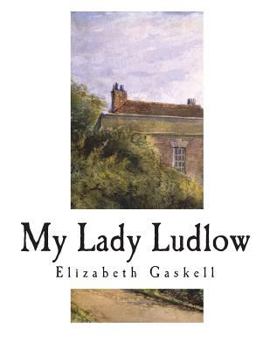My Lady Ludlow
Select Format
Select Condition 
Book Overview
My Lady Ludlow is a novel by Elizabeth Gaskell. It appeared in the magazine Household Words in 1858, and was republished in Round the Sofa in 1859, with framing passages added at the start and end. It recounts the daily lives of the widowed Countess of Ludlow of Hanbury and the spinster Miss Galindo, whose father was a Baronet, and their caring for other single women and girls. It is also concerned with Lady Ludlow's man of business, Mr Horner, and a poacher's son named Harry Gregson whose education he provides for. Elizabeth Cleghorn Gaskell, (n e Stevenson; 29 September 1810 - 12 November 1865), often referred to as Mrs Gaskell, was an English novelist, biographer, and short story writer. Her novels offer a detailed portrait of the lives of many strata of Victorian society, including the very poor, and are of interest to social historians as well as lovers of literature. Her first novel, Mary Barton, was published in 1848. Gaskell's The Life of Charlotte Bront , published in 1857, was the first biography of Bront . In this biography, she only wrote the moral, sophisticated things in Bront 's life, the rest she left out, deciding that certain, more salacious aspects of her life were better kept hidden. Some of Gaskell's best known novels are Cranford (1851-53), North and South (1854-55), and Wives and Daughters (1865).
Format:Paperback
Language:English
ISBN:1722939044
ISBN13:9781722939045
Release Date:July 2018
Publisher:Createspace Independent Publishing Platform
Length:108 Pages
Weight:0.59 lbs.
Dimensions:0.2" x 8.5" x 11.0"
Customer Reviews
1 rating
Change comes to Hanbury....
Published by Thriftbooks.com User , 16 years ago
Elizabeth Gaskell, author of "Cranford" and other excellent stories of mid-19th century England, winds the clock back in a charming tale of change. "My Lady Ludlow" is the story of the small rural village of Hanbury around the year 1800, its ways unchanged for centuries. The noble Lady Ludlow presides over the village, kind-hearted but firm in her beliefs in the existing social order and the evils of too much education. Her ways are challenged by, among others, a young and earnest clergyman who wants to build a schoolhouse, and her own estate steward, who wishes to improve the son of a local poacher. The story is narrated by one Margaret Dawson, a distant and poor relative of Lady Ludlow, who is offered the chance to be properly raised as a gentlewoman. Margaret is witness to a series of episodes involving different people in the village, whose lives all seem eventually to intersect in the person of Lady Ludlow. The Lady Ludlow, despite her attachment to old ways, is too kind and too sensible not to do the right thing for her friends, employees, and tenants. Her dispute with her steward, for example, weaves through most of the book, before being resolved by a decisive act of kindness by the steward that saves Lady Ludlow and the young boy. This and other story twists that brings her to the right thing are often told with humor but filled with acute insight into human nature. Gaskell has captured the genuine push and pull of real people trying to adapt to changing times. Her insights are honest ones; there are no heroes or villains, only real people dealing with real life. The Lady Ludlow's prejudice against education, for example, are given a plausible basis in a hair-raising and ultimately tragic story about two refugees from the French Revolution whom the Lady attempts to help. Gaskell has captured the flavor and texture of a by-gone era in "My Lady Ludlow." Some of the characters and episodes from "My Lady Ludlow" were adapted into the BBC/Masterpiece Theater presentation "Cranford." "My Lady Ludlow" is highly recommended to fans of Masterpiece Theater as the rest of the story and as a fine example of Elizabeth Gaskell's work.







